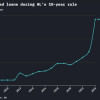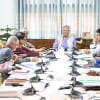Time to bring back smuggled money

With the hush-hush policy gone now that the reign of Sheikh Hasina's government is over, the true extent of our economic crisis is coming to light. According to a report by Bonik Barta, over the last 15 years of her rule, nearly $150 billion, equivalent to around Tk 17.6 lakh crore, was syphoned out of the country. That's more than double the amount of the current national budget—Tk 7.97 lakh crore—which happens to be the biggest in our history.
The report is based on the findings of US-based think tank Global Financial Integrity (GFI). Most of the stolen funds apparently came from big loans taken from banks, mostly by politically influential people and businesses. Those who stole the money included politicians, businessmen, bureaucrats, police officials, high-ups of banks, NBFIs, insurance companies, etc. Even mid-level officials of these institutions were involved. Money was also stolen from various government projects, through inflated prices and orchestrated cost overruns.
Money laundering and trade mis-invoicing were among the popular means for smuggling money, with some of the funds stored in offshore accounts in Switzerland, the UK, the US, Canada, the UAE, Southeast Asian countries like Singapore, and East European countries, among others. Some of the funds were also invested in properties in Malaysia, the UAE, Canada, and the UK. One notable example was the former Land Minister Saifuzzaman Chowdhury who amassed enough money illegally to buy 260 properties in the UK, worth Tk 1,888 crore.
This shows how those who were entrusted with the responsibility of protecting our money were often the ones to embezzle it. The massive pilfering was only possible because relevant state institutions became virtually ineffective because of rampant corruption and irregularities. Several Bangladesh Bank high-ups admitted they were forced to disregard regulations in the face of political pressure. A culture of impunity and lack of accountability let corrupt elements like former police chief Benazir Ahmed get away with amassing illegal wealth.
Awami League was not the first ruling party to facilitate money laundering, nor might it be the last. To ensure this doesn't happen again, we must overhaul and strengthen relevant institutions so that they can do their job properly. Reforms in the banking sector are also long overdue. We must not waste the opportunity for reforms created by the recent student-led mass movement. The interim government, likely to be sworn in later today, must make it a priority to hold accountable those who laundered money and recover the funds to help rebuild our economy.

 For all latest news, follow The Daily Star's Google News channel.
For all latest news, follow The Daily Star's Google News channel. 










Comments